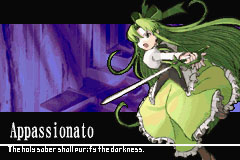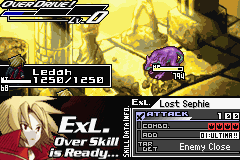|
|

|
BATTLE SYSTEM
|

|
INTERACTION
|

|
ORIGINALITY
|

|
STORY
|

|
MUSIC & SOUND
|

|
VISUALS
|

|
CHALLENGE
|
Unexceptional
|
COMPLETION TIME
|
20-30 hours
|
|
OVERALL
4.5/5
|
Rating definitions
|
|
|
Is it really necessary to reinvent the wheel with every RPG? Certainly the answer would appear to be ‘no,’ for the aspects shared between RPGs regardless of origin makes it clear that these aspects have been refined to the point at which they no longer require conscious thought. Riviera: The Promised Land takes the bold step of indeed trying a wheel reinvention of sorts, with many aspects familiar from other titles having in this case been altered to the point where conscious thought is required once more. The results will displease diehard adherents to the generally accepted wheel aesthetic, but are far from unsuccessful in advancing a different method than the wheel for getting around.
The substitution for the wheel Riviera advances is its pervasive menu involvement instead of having the player (in the person of Ein onscreen) simply move in a fashion akin to other RPGs. Upon arrival in an area, Ein will be presented with options onscreen that are triggered with the D-pad. Pressing Left may take Ein to the next room, while pressing Up may bring the player to an item worthy of further investigation. No movement is accomplished sans these menu options; if this seeming lack of freedom is repellant to the prospective player, know that adjustment is quick. In similar wheel-reinvention fashion, very few items worthy of further investigation (such as treasure chests) onscreen can simply be accessed by Ein. Doing anything requires Trigger Points, as these onscreen items are also known as Triggers. Trigger Points are acquired solely via doing well in battle.
 Never interfere with an Italian fighting technique – they run in the Family!
Never interfere with an Italian fighting technique – they run in the Family!
|
|
Battle is another occasion to display a reinvented wheel. Superficially Riviera’s battles resemble countless others, in that they are turn-based with three characters participating against enemies that use elemental attacks and status effects such as poison, in addition to simple physical attacks. Many tweaks to this standard setup are found on this occasion, starting with the lack of any experience or gold from combat whatsoever. In their places are the aforementioned Trigger Points and items, the latter of which will only be obtained if the party does well in a battle. Doing well is primarily a matter of speed in defeating the enemy along with using the most powerful skill to finish off the last opponent, and this does require getting stronger in customary RPG fashion. Sans experience, statistic increases are garnered via usage of items and weapons. Each character has certain items that s/he can use repeated times until learning a skill with the item, and upon learning a skill statistics go up. Skills in battle are usable after both landing hits upon the enemy and having the enemy land hits upon the party to charge up the Overdrive meter, with individual techniques requiring 1 to 3 charge levels of the 3-tiered meter.
Item skill acquisition is not quite that easy, however. Firstly the enemies in Riviera are finite. If the player wishes to attain good rankings in battle (essential for enough TP to do more than look at the majority of malleable items), sitting around using certain items repeatedly is not the ideal method. More importantly, items have a set number of uses. Once used to the maximum, an item breaks and is gone forever. The way around this limitation is to use the Practice mode, in which previously defeated enemies can be fought once more – without items breaking, and with no ranking to worry about attaining. Practice mode is vital to success and must be used repeatedly if one wishes to have the characters capable of handling enemies in a timely fashion.
Interaction features its own fair share of wheel reinvention, although nothing to the level of the battle system. One very annoying limitation is that 15 items can be carried simultaneously. Once the player acquires a sixteenth item, something must be discarded. This can lead to many Practice sessions for learning a skill hurriedly before something else comes along needing an item slot. There is also the limitation in each battle of 4 items total, which is easily adapted to but can be dangerous if the player wishes to use several items close to breaking. The aforementioned inability to simply move has already been mentioned, and whether it is considered a liability or not will vary according to individual preference. Menu interaction is clean and easy, with its pervasiveness the only potential negative. Except for the inability to individually target enemies in battle – this is because each item’s effects specifically denote where it will attack, and it is up to the player to make a good battle kit. Outside of battle there are frequent instances of action events where the player must have quick reflexes, else generally unwanted effects will result.
 Marmaduke – no!!!
Marmaduke – no!!!
|
|
Riviera begins with Ledah and Ein making their way to the world of Riviera at the behest of Hector, their master, with the task of remaking the world per Hector’s instructions ere a threat has been detected from it eerily reminiscent of the one defeated 1000 years prior. Ledah and Ein are Grim Angels, specifically tasked with this function. Ein is accompanied by his familiar, Rose, who along with Ledah helps to instruct him on the way. Then an event occurs that separates the three, with an amnesiac Ein coming to a village of Sprites (the inhabitants of Riviera) and seeking to aid the endeavors of two Sprites named Fia and Lina to protect the planet. Along the way two other Sprites named Serene and Cierra will also join in the interest of making Riviera peaceful once more.
…This is not exactly breathtaking in its originality, but the execution is far better than a quick synopsis makes it sound. A quality translation from Atlus helps here, along with an aspect of the dating game mixed in. Ein will frequently have choices of dialogue between the four girls, and his responses will affect how favorably each girl views him. The overall plot is affected only at the end, but amusing interludes can result throughout if Ein makes certain choices.
Riviera is not particularly long, and can be completed in the neighborhood of 20 hours if one has mastered the battle system. The first time through will take longer thanks to a need to acquire familiarity however. And replay is highly encouraged in Riviera, thanks to a different ending being present with each girl. Certain areas cannot be visited in the same game, different options might be chosen, items change dependent upon player success or failure at various quick action events; the game is not exactly the same each time through.
At last the aesthetic aspects are advanced upon. Graphically Riviera is not quite at the pinnacle of GBA abilities, but is close enough to look very nice. Battle actions are graced with good-looking animation, the portraits of the major players are redrawn according to emotion, and attractive picture cells are obtained throughout the game, with a fair number being optional and enticing replay. Aurally Riviera shines akin to its French seaside namesake: there are plenty of compositions throughout the game, and none are unpleasant. Many are good enough to warrant repeated listens. Voice acting is present, although not pervasive given the GBA’s limitations in this regard. It is mostly limited to battle and its ramifications, although just this quality makes for a fair amount of voice. The voices are not perfect but are good enough not to make the player despondent.
Riviera’s determination to go against the grain pays off, for the most part. The game is one of the most charming experiences available to the RPGamer currently, and manages to be entertaining throughout. Just about when the game mechanics are getting annoying instead of intriguing – it ends. The complaints listed above are quite valid for a potential player concerned about their annoyance level, but if one can adjust Riviera will prove most memorable.
Review Archives
|









